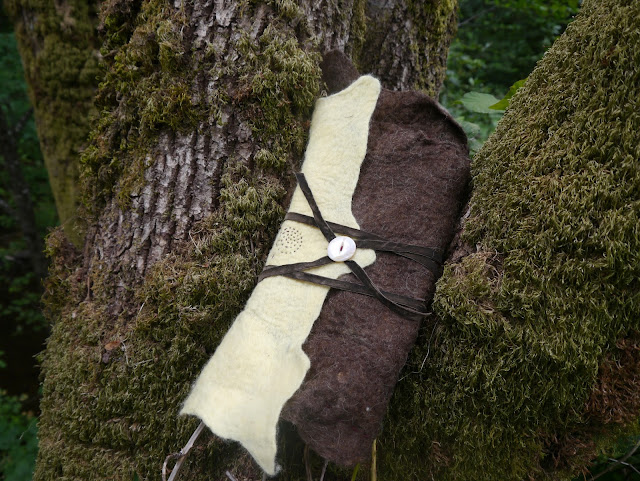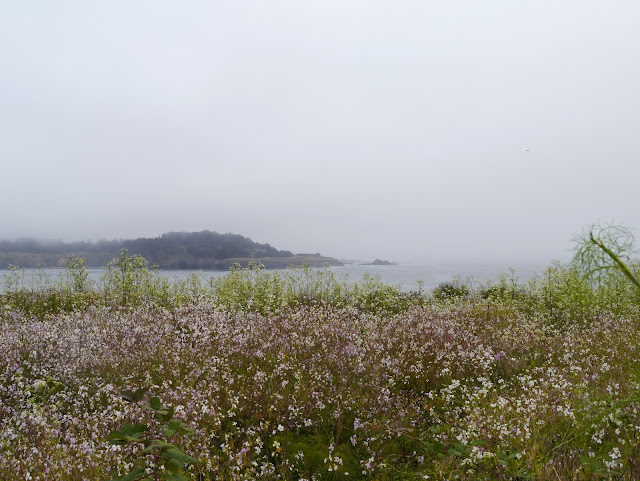My great grandmother Edith Irene DeVilbiss grew up on this Mendocino coastline, outside a little town now called Rockport (then called Cotineva). She grew up on a sheep ranch that ran down to the edge of the ocean, and rode through those coastal prairie bluffs with her long black hair flying. Highway 1 went right through the ranch, with orchards on one side and a way down to the ocean for surf-fishing on the other. At my yearly family reunions, which are held about 15 miles south of Rockport outside the old town of Fort Bragg, where my father's mother grew up (and my grandfather just a little ways inland, in the redwood-rimmed town of Willits), it's always repeated that Edith was the best bareback horse-rider in Mendocino county, and the prettiest, too. I've always felt a special love for this wild coastline, and for sheep, and riding bareback, which I haven't done in many years... so maybe it gets passed on in the blood! As well as the obsession, from an early age, with Irish-Celtic music, story, animistic lore. Black-haired Edith came from a thoroughly Irish mother (both of her mother's parents were from County Cork Ireland), and a French-Swiss-rooted dairy farming father... perhaps it makes sense!

I have been reading a most brilliant novel by Brian Doyle called
Mink River, set in a small coastal town in Oregon. It is pure magic, something like Dylan Thomas's
Under Milkwood, which is one of my favorite things, period, but in a landscape very similar to the wild northern coasts of California (all except for the redwoods, which are only through the very southern tip of Oregon. But the alders, the Douglas firs, the thimbleberries, the salmon, the black bears, the bobcats, the salmonberries,
yes). And as I've been reading it in big delicious inhaling bites out on the back porch in the firshade with my morning tea, I've been thinking about the beautiful old town of Mendocino, up on the coast near where my great-grandmother is from. I was just there a few weeks back, around the solstice-full moon, for the annual family gathering, and spent an afternoon wandering the summer-misted town.
It has always felt so deliciously full of
story to me, all these old structures preserved and nurtured into the 21st century, a thing that does not happen generally in this country. My grandma Teresa (daughter of Edith) has seen the town of Fort Bragg transform dramatically since she was a girl— a Chevron station in the place she lived as a child. The "old town" of Mendocino has been historically preserved on purpose, and thank heavens for that... When old buildings are allowed to stand, old stories stand with them, and places keep their layers, their many ragged skirts, their wild berry bushes. In any season Mendocino is full of vibrant blooming plants, because of the year-round ocean fog.
This is the kind of place I think of when I read
Mink River, when I imagine the community in
Under Milkwood. Everybody held together by the seasalt fog, the gray foxes nesting out in the wild mustard grass, the ghosts of old covered-wagon pioneers and Pomo medicine ladies roaming the cemetery at dawn.
I imagine little girls making stews of nasturtiums in the side-garden and playing make-believe: that heart-hole in the fence, if you look through it you'll see a fortune teller wearing a dress made of ocean waves; no you'll see a knight but he's also a coyote like that one we saw last week and his sword is made out of rat bones; ew that's gross, no I think there's a lady wearing a big fushcia for a dress and she has a pet bumblebee who flies next to her and knows all the gossip of the whole town. Mm, says the other girl, that's nice.
And here, at the bakery, the owner has put up sheets instead of curtains because she likes how crisp and sturdy old cotton bedsheets are, the kinds made by hand half a century or more ago. And really behind those curtains though it appears she is only making croissants and morning buns and scones she is in fact
also, in the wee hours when only a baker is awake and the whole town dark and quiet so that the sound of the ocean is very big, she is also making little dolls out of dough for each person in the town, piece by piece finding the right scraps and berries and thorns to make them with. Not to poke with pins and cause pain, no, but to heal them, to keep people from getting sick. And so for a whole generation, nobody does, not a even a cold...

In the peaked tower above the health food store, which is housed in the red chapel, lives a family of mourning doves and the ghost of a little orphan boy named Samuel whose father was a logger. Samuel has a ghost-pet, a marten, from the big old growth forest where his dad worked and took him out one day, the day of the Accident. Samuel is a nice ghost, though his marten sometimes goes out at night and steals pieces of people's slumber, so for a moment their dreams are full of the sharp crack-snap endlessness of an ancient redwood, falling and falling. Samuel likes the sad cooing of the doves, and the doves like how gentle his hand is when he touches their feathers, just like fog.


There's a boy in the highschool, his name is David, and he won over the prettiest girl, the quiet one always down at the ocean at lunchtime, who none of the other boys could figure out, though they thought she was quite nice on the eyes, and made jokes about her, because one day he stole a whole bowl full of these delicate white fuschias from outside the fancy jewelers where only tourists went, and strung them into a crown clumsily with his mom's thread and a needle, and gave it to her. Well, they called him a sissy after that, the boys did, during gym class, but David knew he was the luckiest out of all of them.

Of course those boys are the same ones who make jokes about the wooden lady's round breasts. Little do they know, as they smoke cigarettes and share a bottle of whisky in a paper bag roaming the empty streets at 3 am, while the baker, unbeknownst to anyone, is baking little perfect dolls of every last person, that the wooden lady can actually hear them, and is laughing to herself. Little do they know that she could consume each one of them with a single kiss, if she were only human. Instead, she busies herself eavesdropping on the guests who come to stay below her perch in the remnant watertower. She has picked up a lot of stories by now, and even more arguments, but if you stopped to ask her, she would only tell you of the very bawdiest or the most tragic.

Meanwhile, the matilija poppies are opening into the heat, the fog, the heat again, flanked by the blue islands of borage flowers. These poppies have much medicine in their bodies for sunburns, for rashes, for soothing any irritation in the inner and the outer skin...They are languishing under the feet of bumblebees. They are carrying on the honey of the world. They are trading old recipes and secrets with the foxgloves, whose knowings are sharp with poison, and vast as the orbits of planets.


The blue house at the edge of the town sits quiet and patient. Nightly he is lapped by ocean fog, and is often re-painted because of the salt-damage. Personally he prefers to be peeling and crystalline. That way little insects come to live under the peeling paint and then small birds follow to eat them, chipping, talking to him. He enjoys when the woodstove is lit in winter, and when the little feet of children run across the wood floors, or when they leave nose-smudges on the windows, or drawings made with fingers when steam from the kitchen has fogged up the glass.
And finally, the ocean beyond the wild radish and hemlock, she sings nightly, she sings daily, her big waves full of foam and driftwood and kelp and the cosmological theories of sea lions, who have quite a lot of knowledge about the deepest depths. She holds the town in her fog, she gets into everybody's minds when they are falling asleep, her salty ancient tunes, her old crab-riddle heart.
* * *
It is good fun to wend and weave and sing my imagination through this old town I've visited so often since I was a little girl. Perhaps my great-grandmother Edith is singing there too, in my blood. When we start to imagine each thing as somehow living, even houses and streets and pieces of wood, each thing with its own stories, the whole landscape around us becomes so very magical, and very enlivening to the heart and mind, because I think we long to be in conversation with the whole world around us, and not just with ourselves, in our heads!



































